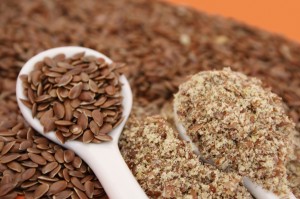 Lately, several of my patients have asked me about adding flaxseed to their diets. They’ve heard a lot about the important health benefits of Omega-3 fats and that flaxseeds are high in these good fats. While I agree that adding Omega-3 fats by adding flaxseeds to your diet is highly beneficial, you also need to exercise a little caution in doing so. Let me explain.
Lately, several of my patients have asked me about adding flaxseed to their diets. They’ve heard a lot about the important health benefits of Omega-3 fats and that flaxseeds are high in these good fats. While I agree that adding Omega-3 fats by adding flaxseeds to your diet is highly beneficial, you also need to exercise a little caution in doing so. Let me explain.
The Health Benefits of Flax Seeds
Flaxseed is truly a miraculous food with many health benefits that are varied and include the following:
- Rich in alpha linoleic acid. A rich Omega-3 fat, which is an excellent alternative to fish oil that some people do not/or cannot eat due to preference or allergy.
- Fights inflammation: Beneficial to conditions such as arthritis, asthma, rheumatoid arthritis, migraine, and osteoporosis.
- Promotes good bone health. Helps both build and preserve bone density.
- Protects against cancer, heart disease and diabetes: Helps keep cell membranes flexible so that insulin and glucose transport is more efficient; helps reduce hardening plaques on arterial walls; helps protect colon cells from cancer-producing toxins.
- Preserves normal blood pressure: Research out of Japan’s Shiga University of Medical Science has shown that people with good Omega-3 intake have lower, normal blood pressure than those who do not. Especially helpful in men with both high blood pressure and high cholesterol levels.
- Lowers cholesterol equal to statin drugs: Studies have shown that Omega-3 fats help to normalize cholesterol levels and do so on par with prescription statin drugs.
- Good source of fiber: The fiber in 1-2 tablespoons of flaxseeds a day can help reduce cholesterol levels and hard arterial plaques.
- Benefits both men and women: The Omega-3 fats and lignan in flaxseeds helped reduce prostate tumor growth in men in a Duke University study. This could be because lignans are converted in the gut to enterolactone and enterodiol, 2 phytoestrogen agents which also help protect women against breast cancer. They also reduced hot flashes in menopausal women by 60%.
- Benefits eye health: One of the most frequent complaints I hear from my over-40 patients is that of dry eyes. This is especially prevalent in peri and postmenopausal women. A study out of Brigham and Women’s Hospital showed that women who consumed the most Omega-3s in their diet had 17% less risk of dry eye syndrome.
The Health Concerns of Flaxseeds
For sure, the health benefits of consuming flaxseeds far outweigh its concerns, but it is important for you to know what these health concerns are before supplementing your diet with flaxseeds.
Flaxseeds contain an agent called cyanogenic glycosides, a chemical that occurs in over 2,000 plants. These compounds are part of the sugar molecules in the plant and convert to cyanide, a poison, in the human gut. If you consume too much of these compounds from plants you could become very ill, or it could be fatal.
However, you would have to consume a huge amount, 200-300 ppm, in a short period of time, for these compounds to adversely affect you as the human body rapidly breaks down cyanide compounds within 30 minutes. A lethal dose would be 0.5mg to 3.5 mg per kilogram of body weight in 30 minutes.
Even though it is highly unlikely anyone would intake a fatal dose of these compounds in using flaxseeds, it is important to be careful giving them to small children and adults with low body weights. Make sure they are stored in an area that a small child cannot get into and accidentally ingest more than they should.
The usual, safe, adult dosage for flaxseeds is under 50 grams, or 2 tablespoons. Heat used in cooking, or baking flaxseeds in foods, such as muffins and breads, destroys the detrimental compounds.
Some people can experience mild gastrointestinal upsets and flatulence when eating flaxseeds for the first time but this usually goes away as your system gets more used to processing them. If it does not, or if it worsens, you may have a food sensitivity, or allergy, to flaxseeds and you should stop eating them. In addition, although researchers are not in agreement on this, I feel it would be prudent for pregnant women not to consume flaxseeds during their pregnancy.
Other potentially dangerous symptoms to watch for include:
- Dizziness, headache
- Closing of the throat, tightening in the chest
- Muscle weakness
- Rapid, shallow breathing
If you experience any of these symptoms after eating flaxseeds, or using flaxseed oil, seek medical attention immediately via a hospital emergency room or an urgent care walk-in, as you may be having a serious allergic reaction to them.
As I tell my patients, flaxseeds are a near superfood when it comes to all the health benefits they confer. In addition to Omega-3 fats they also contain folic acid and B6 as well as magnesium, phosphorus and copper. They can be purchased ground and can be sprinkled on cereal, added to cooked grain dishes, vegetables, baked goods recipes, or shakes.
I feel that flaxseeds, used within the safety guidelines offered above, can be very beneficial to your health and add a delicious, nutty flavor to your favorite foods!
Yours for vibrant health,
Mark Rosenberg, M.D.
Cyanogenic glycosides, http://extoxnet.orst.edu/faqs/natural/cya.htm
Flaxseeds, http://www.whfoods.com/genpage.php?tname=foodspice&dbid=81
Cyanide Poisoning, http://www.cfs.gov.hk/english/multimedia/multimedia_pub/multimedia_pub_fsf_19_01.html
Photo Credit: thermographyforhealth.wordpress.com
